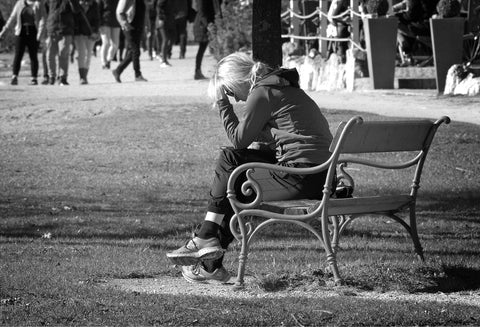At some time in your life, you will unfortunately have to cope with loss.The result of events such as the death of a loved one can leave us confused and in despair. How do you get over the grief? Continue reading for some ways to help leave the past behind you and come to an agreement with your loss.

Grief is revealed in many ways and it can influence every aspect of your life; your emotions, thoughts and behavior, beliefs, physical condition, your perception of self and identity, and your communications with others. Grief can make you feel sad, angry, anxious, shocked, sorrowful, relieved, tired, isolated, irritable or confused. Grief doesn’t have a fixed pattern. Everyone experiences grief individually. Some people may grieve for days and weeks, while others may define their grief lasting for years. Through the process of grief, however, you begin to make up new experiences and habits that turn around your loss.
All embracing, grieving is less ritualised today than it was before, both during the funeral service and in daily life. However, grieving is still an essential part of dealing with any kind of loss, but most importantly the loss of a loved one.
Emotions resulted from the death of a loved one are very strong. If these emotions are not confronted, experienced and coped with, they may become a damaging force in a person’s life.
However, grief should not be handled by the elimination of all other emotions. Avoiding sadness is not normal, however you should also include some celebration of the joy of this person’s life through the funeral service or in other kinds of commemoration.
Often, those who are active in handling all the details at the time of death are the ones who do not get the chance to grieve and to say goodbye. Then, this grief often revels itself later as sickness or depression.
There come to be three commonly recognizable stages of grief that a person goes through after a loss. The first stage is shock and denial. The second is anger and depression. And the final stage is understanding and acceptance.
The apathy that many people experience after the loss of a loved one is the result of the shock and denial one feels when first facing the information about a death. A sense of faithlessness may prevent tears and other outward forms of expression that we suppose with grief.
Tears and anger often start as an individual gets to the second stage of grief. The loss now feels real and it is distressing. Grief begins to influence you physically as well as mentally. You may feel a loss of appetite and sleep, upset stomach and other physical changes. These are all normal reactions that are urgent to be addressed; yet, turning to alcohol or drugs only makes the pain worse and lasts longer.
Lastly, the third stage of dealing with grief is understanding and acceptance. While nobody can ever completely understand the loss of a loved one, harmonizing ourselves with that loss is an essential part of recovery. By living one day at a time and doing positive actions every day to reach the goal of harmony, you’ll find you are beginning to live again. Your active involvement in this process will reduce the time of recovery.
Recommended positive actions toward healing may include meeting friendships and joining support groups or related church events. Moreover, take time to do sports, eat healthy and continue to participate in hobbies and interests you used to do with pleasure. You might want to think about involving new hobbies, activities and friendships in your life.

When a loss is new in your memory, your grief gets your complete attention. Yet, you should draw a line on continued grieving. Give yourself a period of time - maybe a few days to a week - to be extremely sad. Continued wallowing certainly keeps you stuck in your feeling of loss, paralyzed by regret and incapable to move forward.
It's healthy to reach out to people who will look after you when you're suffering. If you can't find a close person, trust the warmhearted stranger or a priest, counselor, or therapist. Even if you feel that you're rambling, baffled and unsure, talking to a person you trust is one form of allowing yourself to start letting out at least a part of the pain you're experiencing. Consider a conversation as a form of "sorting" your emotions - your thoughts don't need to be consistent or logical. They just need to be emotional.
After you've lost someone, at some stage might feel guilty. You cannot change the past by continually contemplating over it. You are not guilty that you lost the person you loved. Instead of digging into what you could have done or should have done, concentrates on what you can do - process your emotions and get over it.
If you feel guilty after a loss, communicate your thoughts to other people who also knew the person. They will almost always be capable to help you prompt yourself that the loss isn't your fault.
Save things that remind you of the person you’ve lost. Just because a person or is not alive doesn't mean you cannot remember them. It may be encouraging to know that even if the person is gone, the friendship, emotions and personal ties you have with them will always remain. Nobody will ever be capable of taking that away from you, and the connection you have with him or her will always stay with you. Some memories will always be worth remembering to remind you of your personal courage, determination and ability to think about a better future.
